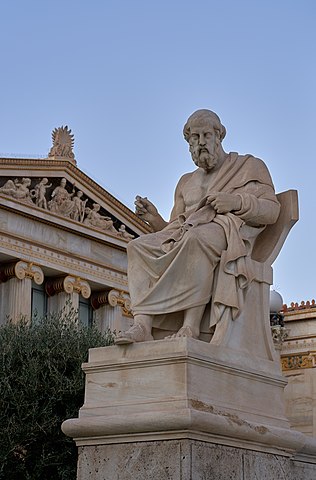
Philosophers: 3: Plato
Plato: The Father of Western Philosophy
Plato is widely regarded as one of the most influential thinkers in Western philosophy and one of the founders of its philosophical thought. His works, including his famous Republic, have had a lasting impact on Western culture and been studied for centuries by scholars and students around the world.
Born in Athens in 428 B.C., Plato was the son of an affluent Athenian family. He was a student of Socrates, another famous Greek philosopher, and was heavily influenced by his teachings. After Socrates’ death, Plato travelled to Egypt and Italy, where he studied mathematics and philosophy. He eventually returned to Athens and opened his own school, the Academy, which was the first known institution of higher learning in the Western world.
The Republic
At the Academy, Plato developed his own theories and ideas on a wide range of topics, including government, morality, and ethics. His most famous work, The Republic, is a dialogue between Socrates and several other characters, in which they discuss the ideal form of government and society. The Republic is divided into 10 books, each of which deals with a particular topic. The first book lays out the foundations for an ideal state, and those remaining explore various aspects of one. At the centre of the Republic is the notion of justice, which Plato defines as “doing one’s own work, and not meddling with what is not one’s own.” He also argues that justice is only possible in a well-ordered society, and that a just society requires that each person has an education and occupation that is appropriate to their nature.
In Republic Books II to IV, Plato argues that a well-ordered society should be divided into three classes: the producers, the auxiliaries and the guardians. The producers are those who are responsible for the production of goods and services, while the auxiliaries are responsible for the maintenance of law and order in the state. Finally, the guardians are responsible for the education and upbringing of the citizens. Plato also argues that justice should be based on the rule of law and that the rulers of the state should be chosen on the basis of merit.
In Books V to IX, Plato explores various aspects of the ideal state, including its laws, education system, religious beliefs, and the role of women. He also discusses the nature of knowledge, truth, and the soul. In Book X, he considers the implications of the ideal state for the individual and for the world. Gathered all together, The Republic forms an important work of philosophy and it continues to be highly influential.
Further Fields Of Thinking
Plato also wrote extensively on metaphysics and epistemology, or the study of knowledge. In his dialogues, he argued that true knowledge comes from reasoning, rather than from the senses. He also believed that there are higher forms of reality that can be accessed through contemplation and meditation. Throughout his life, he wrote many works, including Theaetetus, Symposium, and Phaedo. He wrote extensively on the nature of the soul, which he believed to be immortal, and the importance of pursuing knowledge and virtue.
Plato is known as the “Father of Western Philosophy” due to his profound and lasting impact on philosophical thought. He was an influential thinker who shaped Western philosophy and helped to establish the field as a legitimate academic discipline.